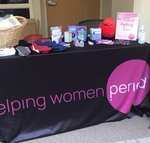

One late January night, Lysne Tait and Amy Stephenson stumbled across an article about the lack of menstrual products for people experiencing homelessness. The two friends began emailing each other about the story and were mutually taken aback by the issue.
They knew they had to do something.
“We were both astounded, we had never considered that this was an issue,” said Tait, who then co-founded Helping Women Period alongside Stephenson. Prior to that, the pair were no strangers to giving.
“We’d given soup and cereal to food banks, but we never thought about pads and tampons,” said Tait, the nonprofit’s executive director.
Feeling the need to help, Tait and Stephenson invited 30 of their closest friends to a fundraiser with a goal of raising $400 to buy menstrual products and donate them to a local shelter.
Advertising for the event went live on a Sunday. Within two days, 100 people responded. Two days after that, they filed to form a nonprofit and people from all over the world offered to help.
Their goal of $400 turned into raising approximately $4,000. With that money, the newly formed organization reached out to a local janitorial supply company, allowing them to provide a year’s’worth of product for $35 per person. Working with 180 charity partners in 17 counties, they were able to provide 26,000 periods’ worth of products last year.
During the pandemic the demand for aid became even greater, yet Helping Women Period lost volunteers, many of which were elderly or college students.
“At the beginning we had a lot of new people that I’d never seen before” needing assistance,” Tait said. “There were a lot of restaurant workers and people who were suddenly out of a job and needed extra help.”
In February, Michigan repealed the “Tampon Tax,” a 6% tax imposed on menstrual products. Tait claimed since the repeal is new, there hasn’t been enough time to gauge the cost effects for the organization. However, she said the repeal has already “brought a lot of attention to menstrual equity and period poverty.”
Tait mentioned that people often think period poverty only happens in developing nations.
“One in four girls here in Michigan don’t go to school because they don’t have the product they need when they need it,” Tait said. Providing free products in schools is the next project for the organization. The organization has also made a big push to be inclusive for all who experience periods, including changing their logo and using more representative language, not just women and girls.
Despite being an “accidental nonprofit” as Tait jokes, she said part of the reason Helping Women Period grew overnight and has received ample support is around half of the population experiences periods.
“Everyone loves someone who’s had a period,” she remarked.
Support City Pulse - Donate Today!
Comments
No comments on this item Please log in to comment by clicking here